This Italian-style lemon ricotta cake is light, fluffy, and rich all at the same time, with a touch of extra virgin olive oil so it’s beautifully tender and flavorful.
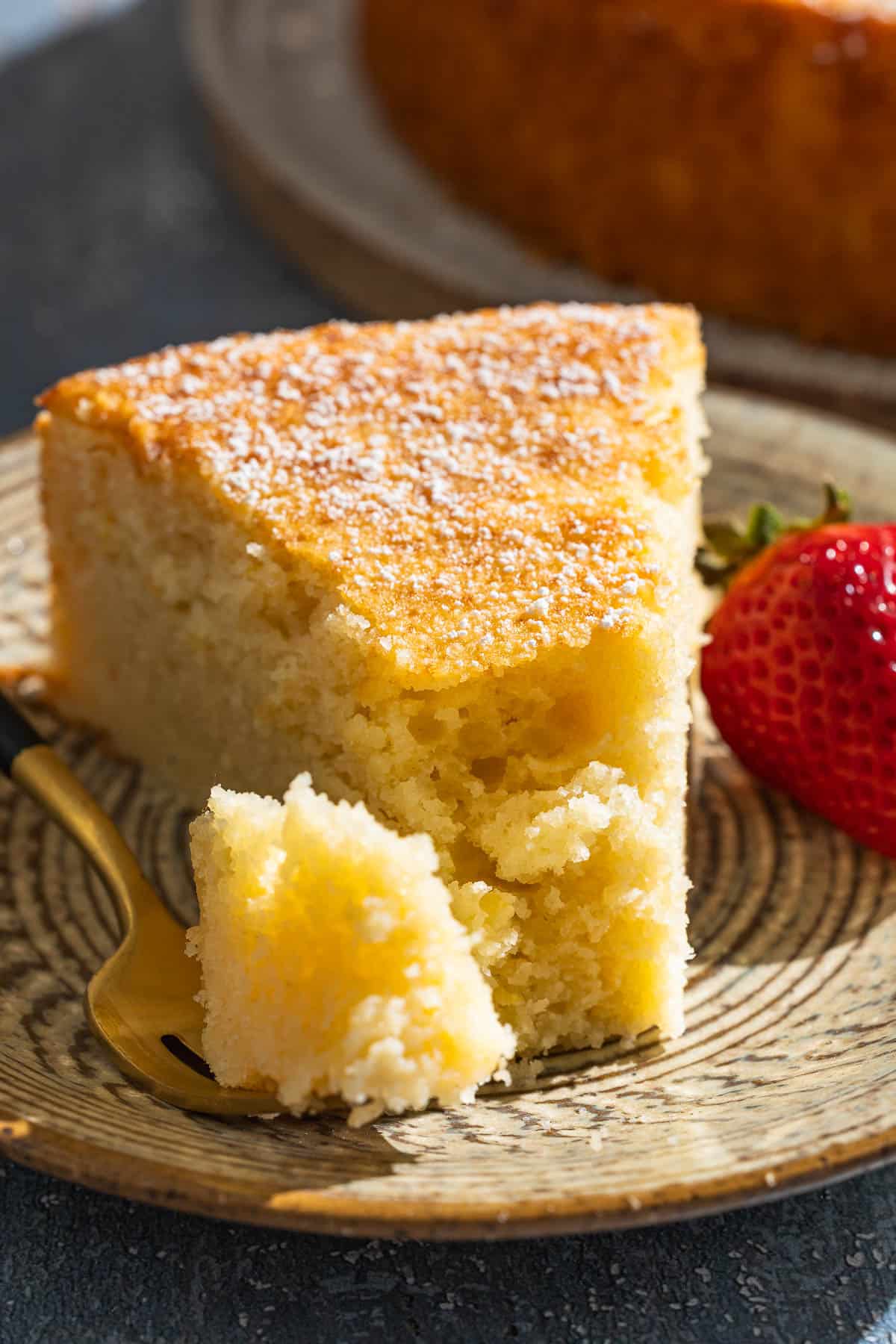
This lemon ricotta cake recipe is full of dualities. It’s dense but fluffy, rich but light, and creamy yet bright. It looks rustic from the outside, but a slice exposes the crumb’s alluring texture. The bright lemon flavor also helps to keep it feeling light, balancing the richness of the ricotta, butter, and olive oil.
Whether I’m making Fig Cake or Shortcakes, I often prefer to use olive oil for the added depth of flavor, even if it’s not strictly traditional. The oil gives the cake a more nuanced flavor, and keeps it fresh for longer.
A friend recently visited amid a lot of cake testing, and this was the cake that disappeared first. Slices seemed to vanish no matter the time of day. We even had cake for breakfast, guilt-free since I’ve learned that cake for breakfast is common in Italy!
Table of Contents
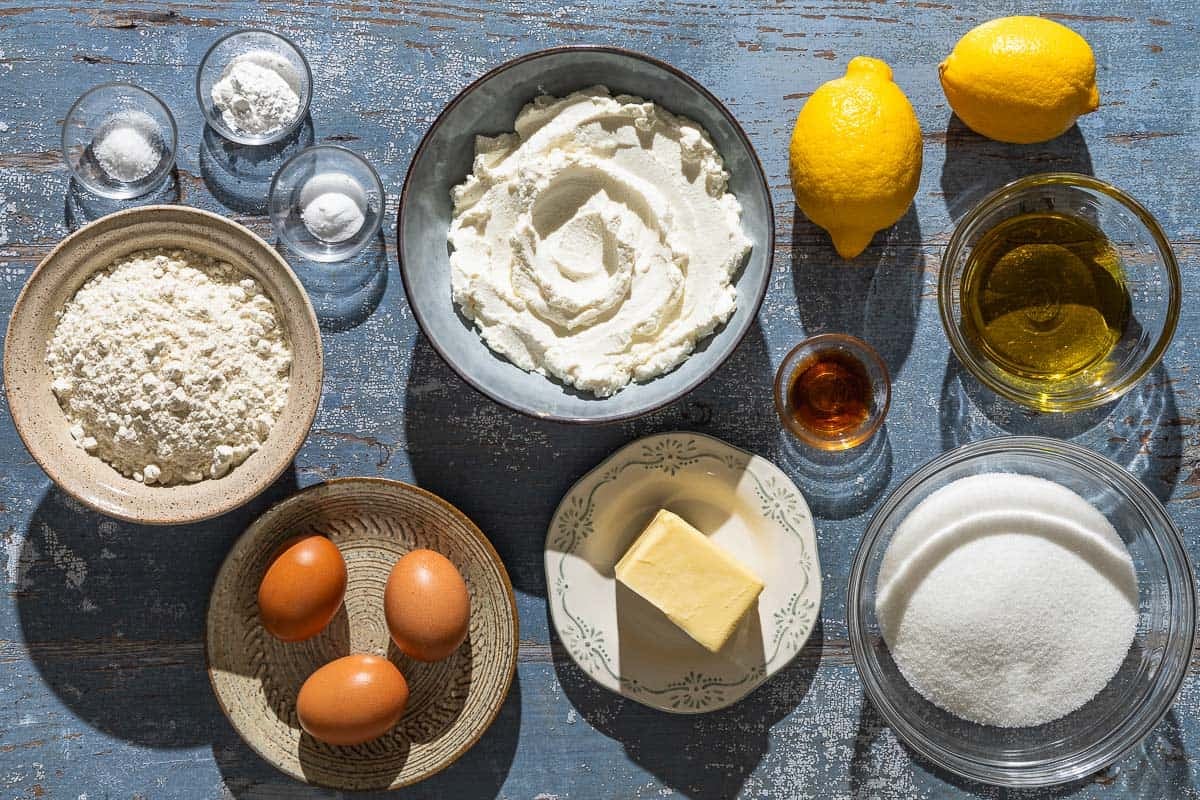
Lemon Ricotta Cake Ingredients
The enchanting texture of this cake comes from the ricotta, which is also a major contributor to the creamy lemon flavor. Use good quality whole milk ricotta and organic lemons for the best flavor and texture. Here’s what else you’ll need:
- All-purpose flour: Flour provides the structure for the cake. You can use one-to-one gluten-free flour, but the cake may be slightly denser.
- Baking powder and baking soda: These rising agents make the cake fluffy and light.
- Salt: Salt enhances the flavors of the lemon and ricotta cheese.
- Granulated sugar: Sugar does more than sweeten. It also retains moisture, keeping the cake tender for days.
- Butter: Butter not only adds richness and flavor but also aerates the batter when mixed with the sugar, helping to make the cake fluffy.
- Extra virgin olive oil: Olive oil adds richness and keeps the cake soft and moist. Use a high-quality extra virgin variety that’s light and smooth for the best flavor, like our Arbequina.
- Eggs: Eggs add structure and act as a binder.
- Ricotta cheese: Ricotta cheese is creamy and slightly sweet. It makes the cake rich without making it too dense.
- Lemons: Lots of lemon zest and a squeeze of lemon juice give a bright lemon flavor that contrasts with the rich ricotta.
- Vanilla extract: Vanilla adds depth and complexity with floral and caramelly flavors.
- Powdered sugar: Gives the cake a rustic yet elegant final presentation.

How to Make Lemon Ricotta Cake
While you could cream the butter and sugar by hand with a whisk, save your arms and shoulders the pain and use an electric mixer. It’s important to let the cake cool completely before dusting with powdered sugar and serving, so count on the cake being ready to eat in about two hours. Here’s how to make it:
- Get ready: Preheat the oven to 350°F. Liberally grease the bottom and sides of a 9-inch springform pan with butter. Line the bottom of the pan with a round of parchment paper and grease the parchment paper.
- Combine the dry ingredients: In a medium mixing bowl, whisk together 2 cups flour, 2 teaspoons baking powder, 1/2 teaspoon baking soda, and 1/2 teaspoon kosher salt.
- Beat the butter and sugar: Using a stand mixer fitted with the paddle attachment or a large mixing bowl with a hand mixer, beat 1/2 cup room temperature butter, 1/4 cup olive oil, 1 1/2 cups granulated sugar, and the zest of 2 lemons on medium speed until light and creamy, about 3 minutes.
- Incorporate 3 large eggs: Add them one at a time to the creamed butter, beating well and scraping the bowl with a silicone spatula between each addition.
- Incorporate the ricotta cheese: Add 1 1/2 cups ricotta cheese and mix on low speed until fully combined.
- Alternate adding the flour and lemon juice: Use a silicone spatula or wooden spoon to fold in half of the dry ingredients to the ricotta mixture. Pour in 1/4 cup lemon juice and 1 teaspoon vanilla extract and gently stir to incorporate, making sure to scrape the bottom and sides of the bowl. Add in the remaining dry ingredients, mixing with the spatula just until combined.
- Bake: Pour the batter into the prepared pan and smooth the top. Bake for 50 to 55 minutes, or until a toothpick inserted into the center of the cake comes out clean.
- Cool: Let the cake cool in the pan on a wire rack for 20 minutes. Run a butter knife around the edges of the cake. Release the spring and remove the outer ring, then transfer the cake onto a wire rack, peel off the parchment paper, and allow it to cool completely, about 1 hour.
- Serve: Dust the top of the cake with powdered sugar. Slice and serve.
Tips and Tricks for Lemon Ricotta Cake
I’ve never made a version of this cake that didn’t taste wonderful, but I’ve found that the temperature of the ingredients makes a big difference both in mixing and in the final texture of the cake. Here are my tips for the best lemon ricotta cake:
- Use very soft room temperature, but not melted, butter. Let the butter sit for at least an hour out of the fridge, potentially longer depending on the temperature of your kitchen. You should easily be able to leave a dent in the butter with your finger when pressed.
- Use room-temperature eggs and ricotta as well. Take them out of the fridge about 30 minutes before mixing. The batter will combine better, leading to a fluffier cake. Cold eggs or cold ricotta could shock the butter and break the emulsion.
- Gently incorporate the dry ingredients to avoid overmixing. I switch to a silicone spatula instead of an electric mixer.
- Nervous about overflowing? This lemon ricotta cake recipe makes the cake pan look full enough to make me worry, but so far it’s never overflowed the pan while baking. If you’re nervous, set a baking sheet on the shelf below the cake just in case.
- Mix it up. I’ve also made this using the zest from one orange and I’m curious about using another citrus, like yuzu, grapefruit, or blood orange. Or even adding a teaspoon of cinnamon or cardamom.
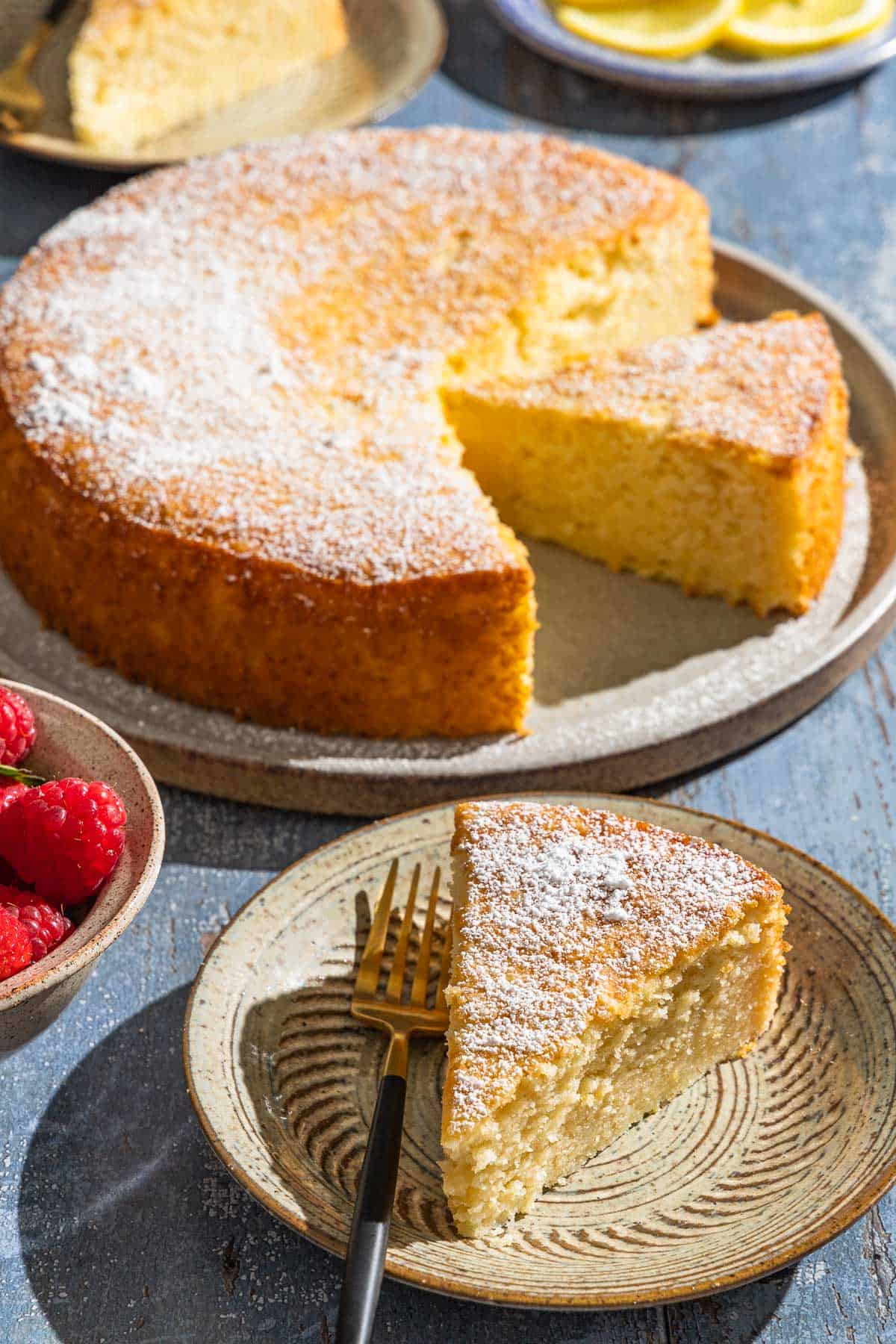
Why Use a Blend of Olive Oil and Butter?
Creaming the butter and sugar creates tiny air pockets in the batter that expand while the cake bakes, making it rise and giving it a velvety texture. But, butter cakes can often taste dry.
Olive oil makes a moister, softer cake than butter, but use too much and the olive oil flavor can overpower the other flavors and the crumb can become coarser. By using a blend of butter and olive oil, you get a cake with a balanced flavor that is fluffy, velvety, and moist.
You can, of course, make this using all olive oil, skipping the butter. The cake will have a slightly coarser crumb and the olive oil flavor will be much stronger.
It will taste like an olive oil cake with ricotta and lemon, rather than a lemon ricotta cake. But trust me, while different, it’s just as good with your afternoon coffee.
What to Serve with Lemon Ricotta Cake
Lemon ricotta cake is moist and fluffy, perfect all on its own. But you can dress it up with a spoonful of whipped cream or lightly sweetened Greek yogurt. I like to add a small handful of berries, either fresh or macerated. Or you could make this strawberry compote with rose, mint, and honey.
For a sweet afternoon merenda (afternoon snack), serve alongside a hot cup of coffee or tea, or even a spiked coffee. In the evening, serve it as an after-dinner dessert with an after-dinner drink. Limoncello is sweet, bright, and floral, a natural match for this lemon-scented cake.
More Ricotta Cake Recipes
Browse all Mediterranean recipes.
Visit Our Shop.
Lemon Ricotta Cake
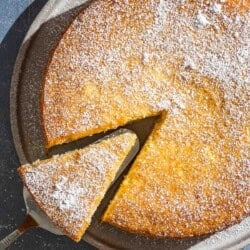
Equipment
- 1 (9-inch) springform cake pan
Ingredients
- 2 cups (240g) all purpose flour
- 2 teaspoons baking powder
- 1/2 teaspoon baking soda
- 1/2 teaspoon kosher salt
- 1/2 cup (113g) unsalted butter, at room temperature, plus more for greasing the pan
- 1/4 cup (55g) extra virgin olive oil
- 1 1/2 cups (300g) granulated sugar
- 2 lemons, zested and juiced to make 1/4 cup lemon juice
- 3 large eggs, at room temperature
- 1 1/2 cup (340g) ricotta cheese, at room temperature
- 1 teaspoon vanilla extract
- Powdered sugar, for serving
Instructions
- Get ready: Preheat the oven to 350°F. Liberally grease the bottom and sides of a 9-inch springform pan with butter. Line the bottom of the pan with a round of parchment paper and grease the parchment paper.
- Combine the dry ingredients: In a medium mixing bowl, whisk together the flour, baking powder, baking soda, and salt.
- Beat the butter and sugar: Using a stand mixer fitted with the paddle attachment or a large mixing bowl with a hand mixer, beat the butter, olive oil, sugar, and lemon zest on medium speed until light and creamy, about 3 minutes.
- Add the eggs: Add the eggs to the creamed butter, one at a time, beating well and scraping the bowl with a silicone spatula between each addition.
- Incorporate the ricotta cheese: Add the ricotta cheese and mix on low speed until fully combined.
- Alternate adding the flour and lemon juice: Use a silicone spatula to fold in half of the dry ingredients to the ricotta mixture. Pour in the lemon juice and vanilla extract and gently stir to incorporate, making sure to scrape the bottom and sides of the bowl. Add in the remaining dry ingredients, mixing with the spatula just until combined.
- Bake: Pour the batter into the prepared pan and smooth the top. Bake for 50 to 55 minutes, or until a toothpick inserted into the center of the cake comes out clean.
- Cool: Let the cake cool in the pan on a wire rack for 20 minutes. Run a butter knife around the edges of the cake. Release the spring and remove the outer ring, then transfer the cake onto a wire rack, peel off the parchment paper, and allow it to cool completely, about 1 hour.
- Serve: Dust the top of the cake with powdered sugar. Slice and serve.
Notes
- Shop this recipe: Visit our shop to browse quality Mediterranean ingredients including the olive oil used in this recipe.
- Tips for success:
- Use very soft room temperature, but not melted, butter. Let the butter sit for at least an hour out of the fridge, potentially longer depending on the temperature of your kitchen. You should easily leave a dent in the butter with your finger.
- Use room-temperature eggs and ricotta as well. Take them out of the fridge about 30 minutes before mixing. The batter will combine better, leading to a fluffier cake. Cold eggs or cold ricotta could shock the butter and break the emulsion.
- Gently incorporate the dry ingredients to avoid overmixing. I switch to a silicone spatula instead of an electric mixer.
Nutrition
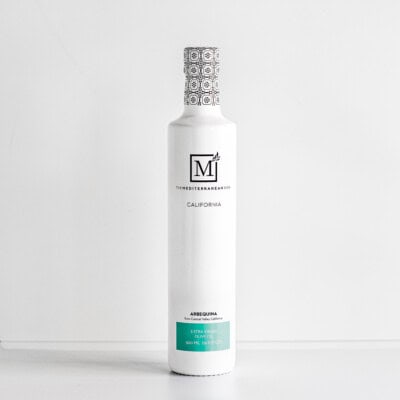
Try our Arbequina
Extra Virgin Olive Oil
Yes, you can bake with olive oil! You want something mild and fruity like our Arbequina from California. Try it today!



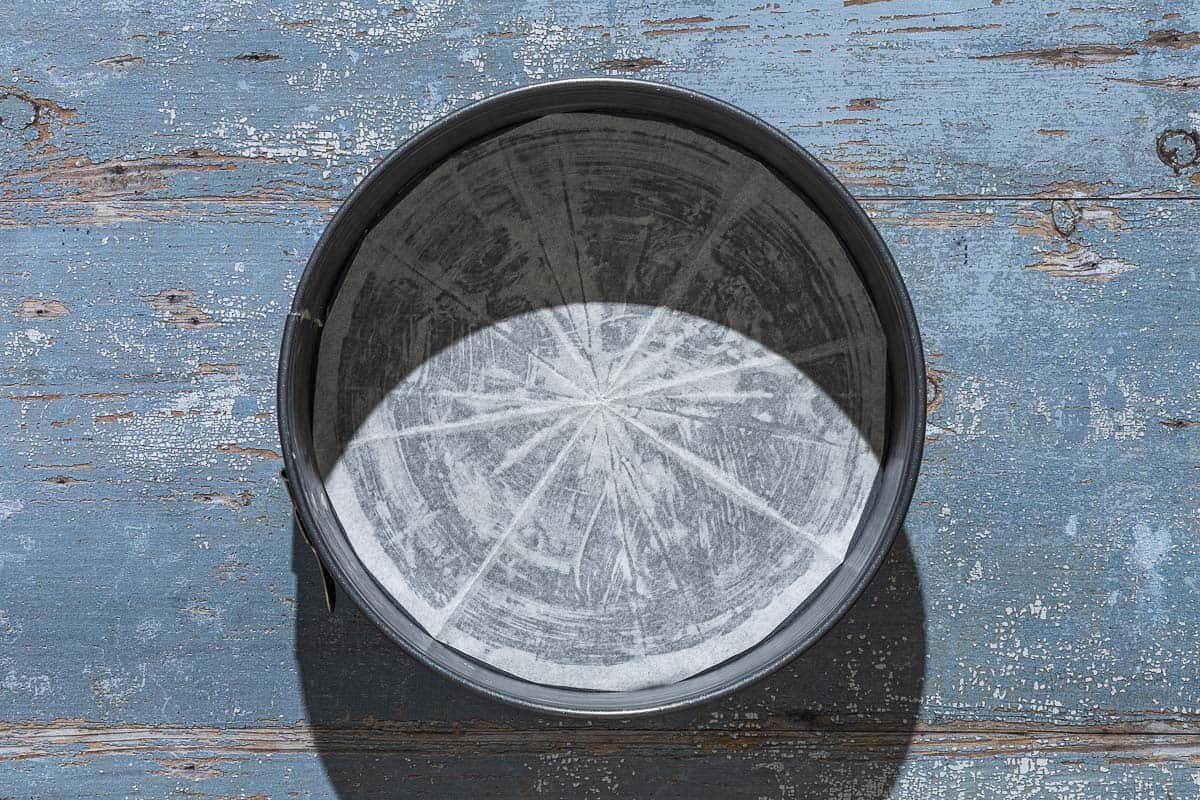
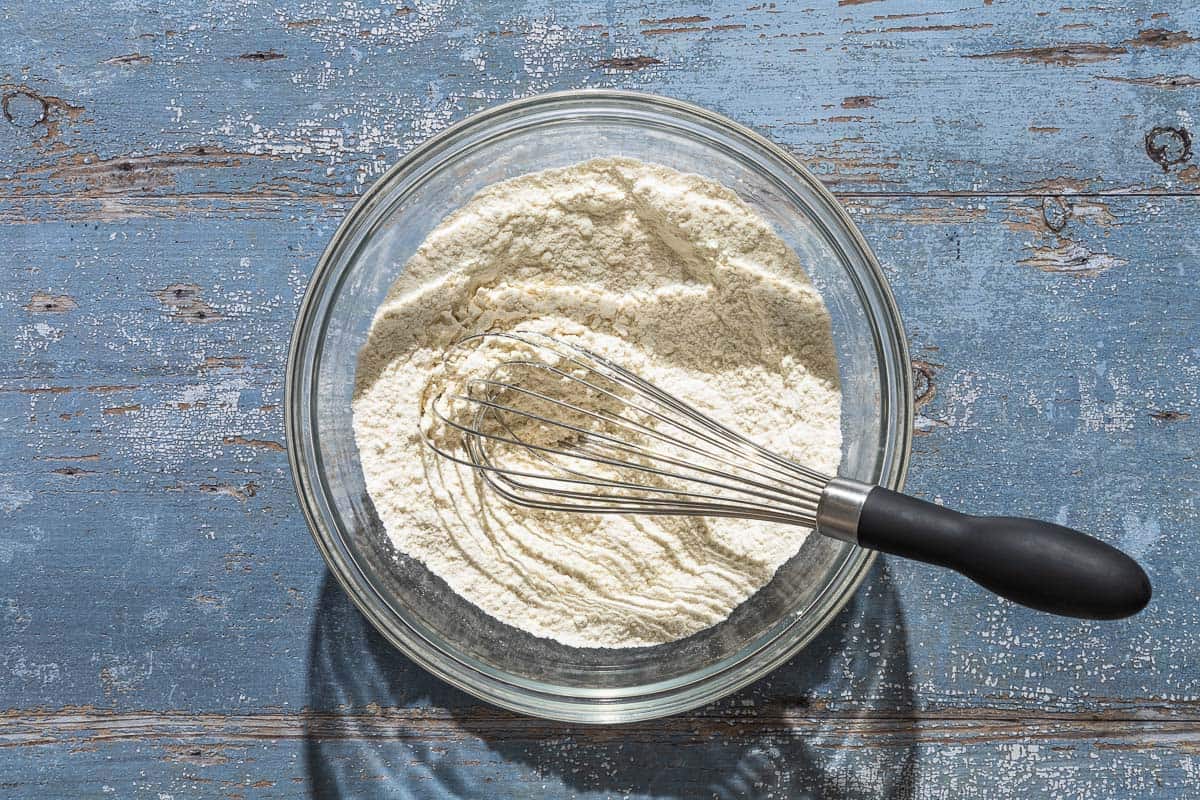
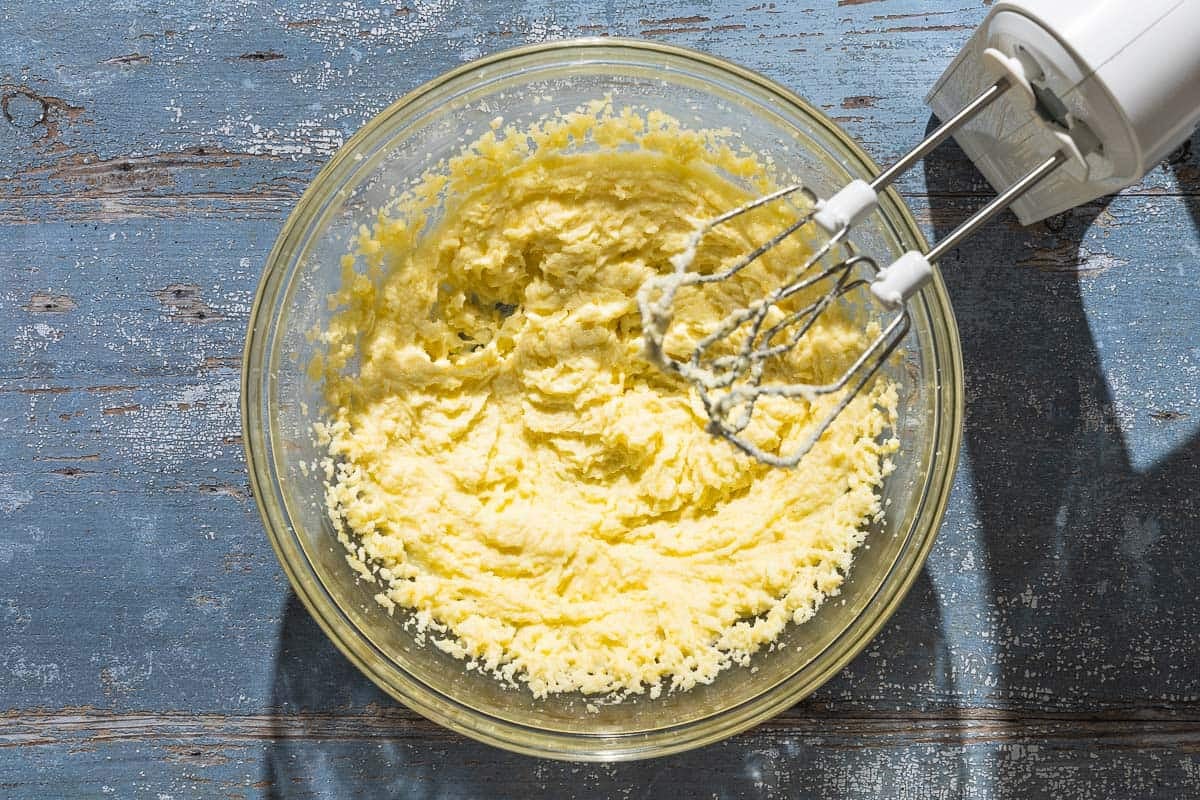
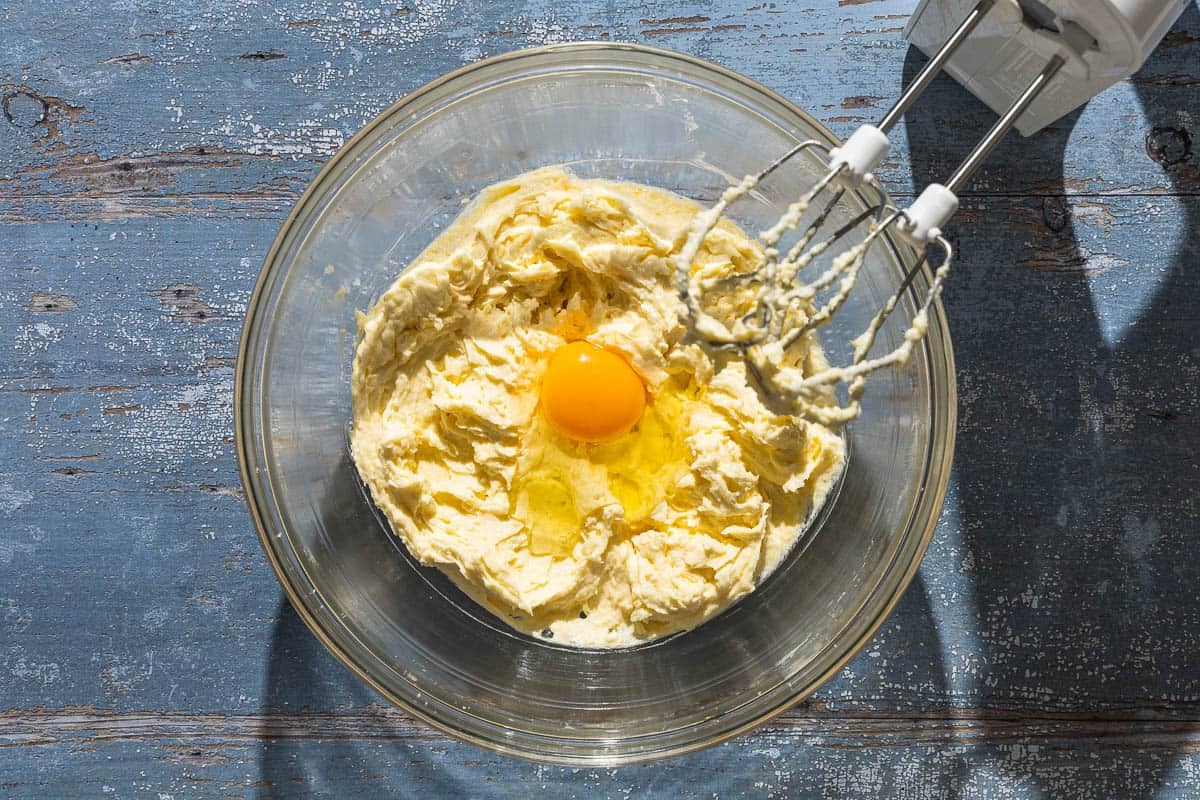
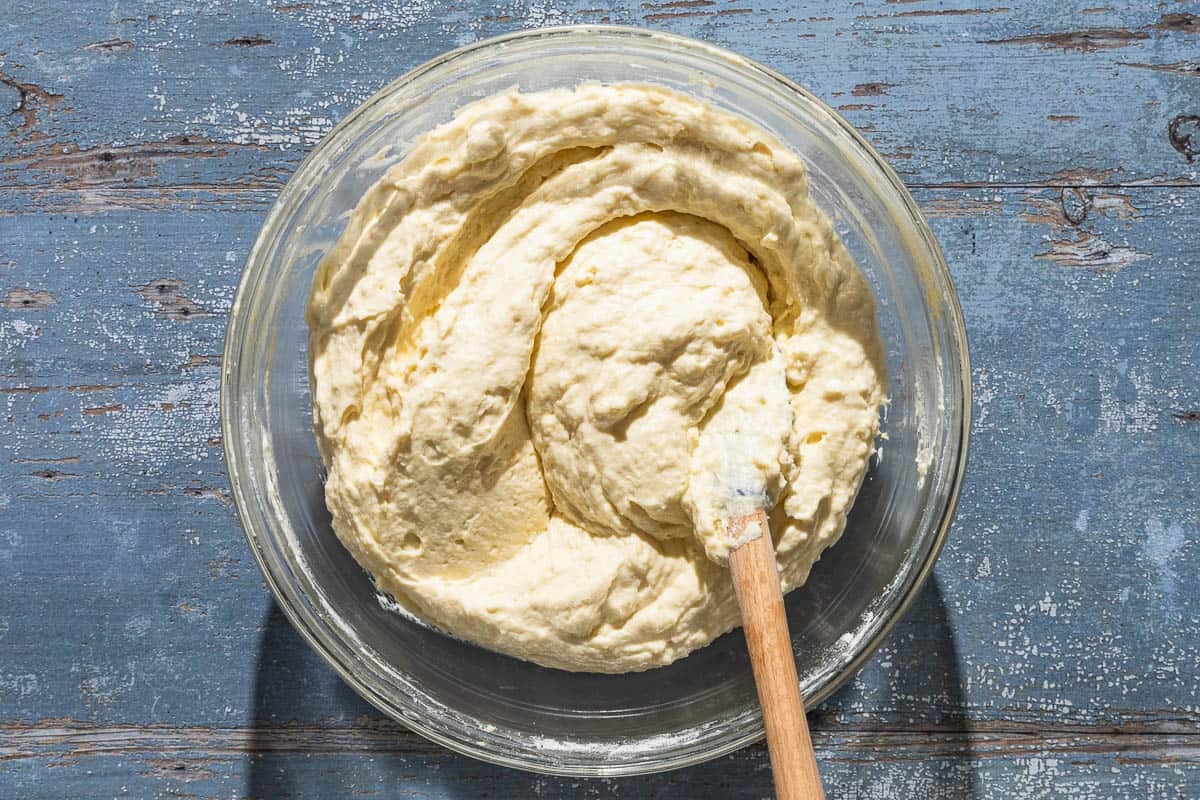
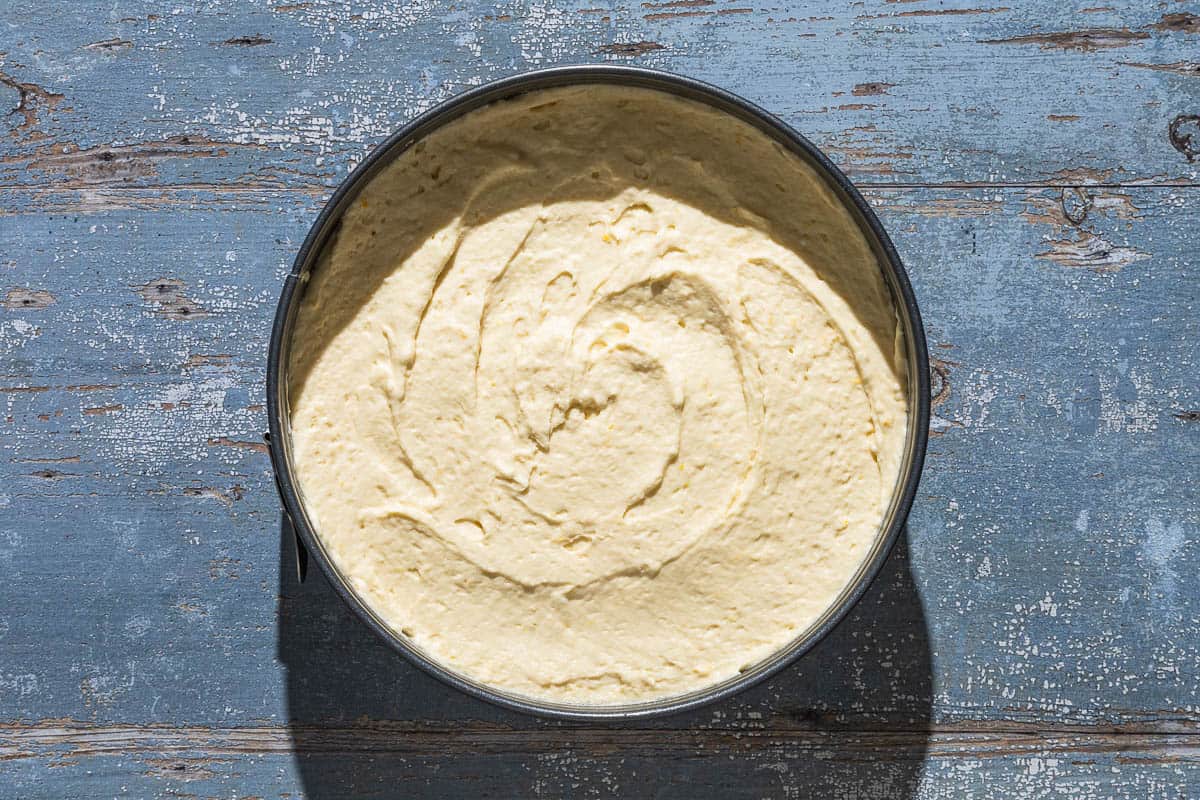
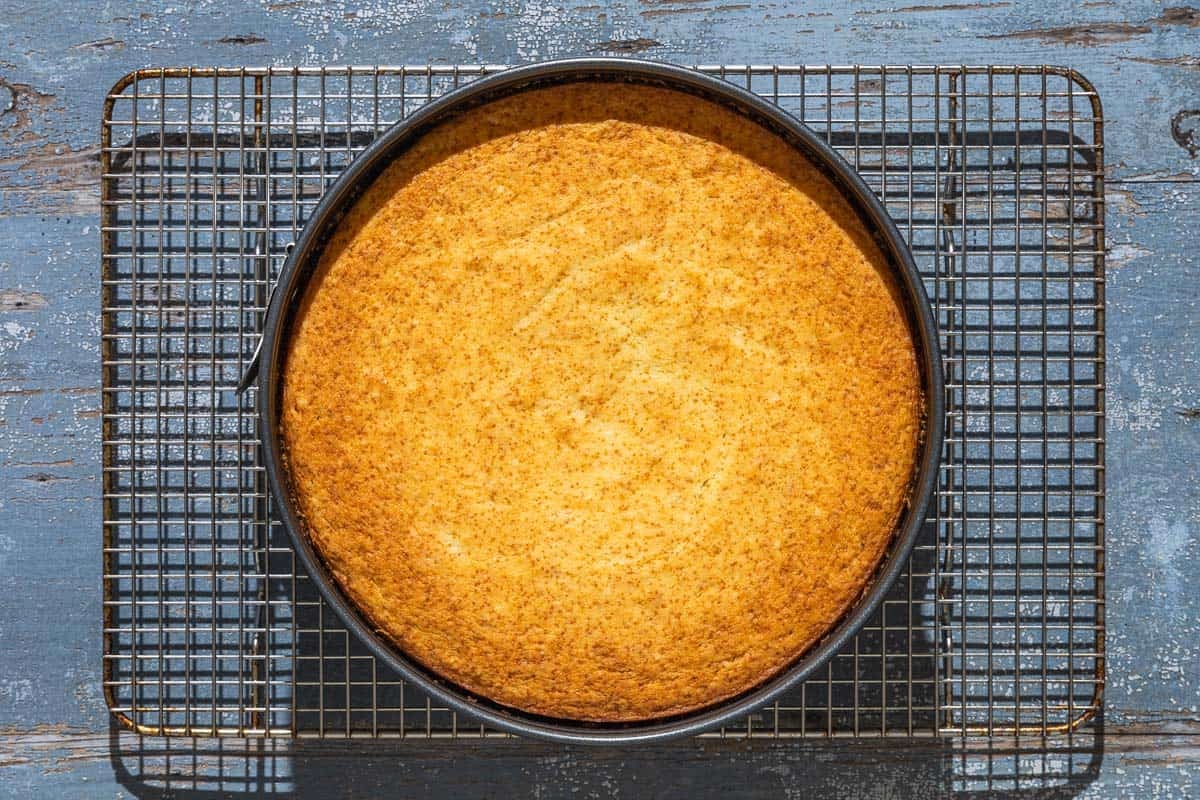
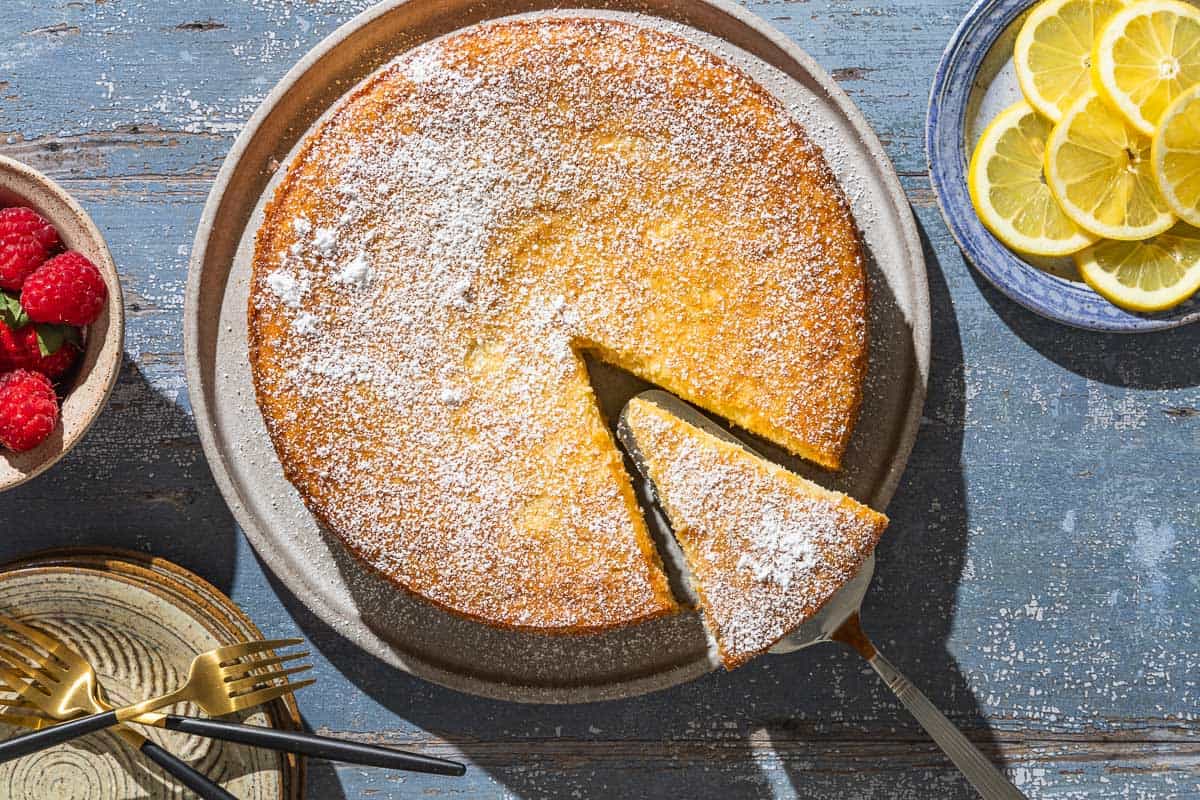


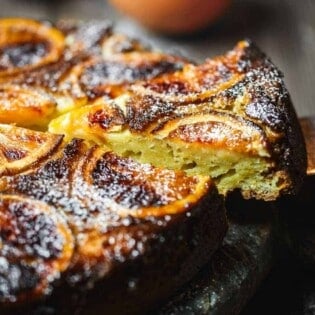
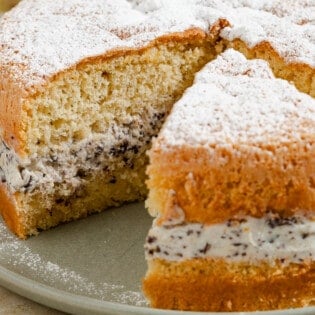
Delicious cake tastes so good, read the tips as it helps from getting it right, thanks for sharing my definite go to cake!
question? recipe does not say to strain the ricotta, yes or no?
Hi, Debbie. There’s no need to strain the ricotta here. Hoe you give the recipe a try!
So, one inverts the cake onto the rack after removing the outer ring? Otherwise, I don’t see how one can peel off the parchment paper.
This easy to follow recipe develops a cake that is light, moist and with a delicious lemon flavor.
do i need to adjust ingredients if I use a 10″ springform pan?
Hi, Dina. We’ve never tested either, but it should work without having to adjust the ingredients. You might just have to adjust the bake time a bit.
How do I adjust this recipe for high altitude
Hi, Claire. We have never tested making this recipe at a high altitude, so it’s a bit hard to say what adjustments would need to be made. If you decide to do a little experimenting with it, please stop back and let us know how it went!
Can I use a 10″ springform cake pan. That is all I have.
Hi, Sandra. I see you were asking about using either a 10″ springform pan or a 10″ bundt pan for this recipe. We’ve never tested either, but they should work. You might just have to adjust the bake time a bit.
Can I use a 10″ Bundt Pan. That’s all I have
Cake came out delicious! How do I store this delicious cake? Refrigerate or not?
Hi, Cynthia. You can cover and store this cake at room temp for just a few days. If you want to extend its life, you can place it in an airtight container and store it in the refrigerator for a bit longer.
Does this cake freeze well? I’m looking to use up some ricotta I have left over from another recipe.
Thank you!
Hi, Kim. It does! Just be sure to wrap it tightly.
I made this for Father’s Day as a nice refreshing dessert after dinner. It was delicious. I even made it Gluten Free for my son with measure for measure GF flour. It turned out great. I did watch it closely and took it out right when the toothpick came out clean….which was about 47 minutes. I followed the directions about getting the butter, eggs and ricotta to room temperature and followed the mixing instructions exactly….I think that is key! After it baked I put blueberries on the platter around the cake and then glazed the cake with a simple lemon glaze. (powdered sugar and lemon juice) I will be keeping this recipe handy!! Love it!
Great
I think the cake looks delicious and I really want to make it. I’m living in Thailand and it’s would be nice to make something like in US.
Hello Mark, I have question about Lemon Ricotta Cake can I use olive oil instead of using 1/2 C. unsalted butter because I am not supposed to cook or bake with butter.
Thanks
Ladda
Hi, Ladda! I’m Summer and I work here at The Mediterranean Dish. This is what Mark has to say in the post about using all olive oil, “You can, of course, make this using all olive oil, skipping the butter. The cake will have a slightly coarser crumb and the olive oil flavor will be much stronger. It will taste like an olive oil cake with ricotta and lemon, rather than a lemon ricotta cake. But trust me, while different, it’s just as good with your afternoon coffee.”
I hope that helps. IF you make it with all olive oil, please report back and let us know what you think!
What if I sub cottage cheese?
Hi, Janet. Unfortunately that’s not something we’ve tested with this recipe, so I’m not sure how well it would work. If you decide to give it a go, though, we’d love to hear your thoughts!
Do you have to use springform pan?
Hi, Anne. You can use another a standard 8-9 inch round cake pan instead if that’s all you have on hand. Springform pans are taller, though, so just make sure you don’t fill your pan more than 2/3 full. Once the cake is cooled, you may need to slide knife between the edge of the pan and the cake to help it release.